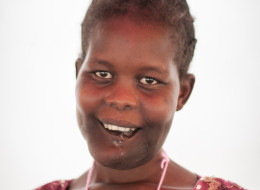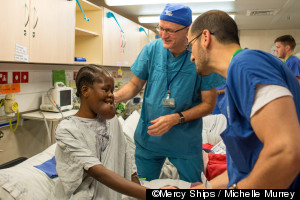I am not a mother.
I'm also not a father, an obstetrician, a pediatrician, a maternal health specialist, or any of a number of other things that most of us -- myself included -- think of when we think of motherhood. I'm trained as a surgical oncologist. So what, you ask, qualifies me to write about motherhood?
But hear me out for a second. Let me tell you a story.
This story begins on a ship docked off the coast of the Republic of Congo. About a month ago, on this ship, I met Anoirite, a twenty-four-year-old Congolese woman from Bétou, a small village on the western bank of the Congo River, near the tripartite border shared by the Republic of Congo, the Democratic Republic of Congo, and the Central African Republic. Anoirite is the mother of three children, the youngest of whom just turned five.

About a decade ago, she noticed a small mass on her jaw. Here's the thing: Bétou is a two-day journey by boat from the two largest cities in Congo, where two-thirds of the country lives. Getting by car to either Brazzaville, the capital, or Pointe Noire, the port city, would have taken her 40 hours, covering nearly three thousand miles and traversing four countries.
The 4.3 million people in this Central African country are served by 430 doctors. (For comparison, the US has nearly 850,000 doctors, or twenty-five times as many doctors per person as Congo). Of those doctors, only twelve could conceivably have treated Anoirite's tumor, and every single one of them lives in Brazzaville or Pointe Noire. And, even though the average Congolese person lives on about $12 a day, Anoirite and her family live on far less.
Distance to a health care facility, the cost of care, and a dramatic lack of providers are not just arcane facts. They present very real barriers to care for Anoirite, meaning that her tumor was left to grow. And, like all tumors, it did, until it had engulfed much of her lower face.
But Anoirite's struggle was not just physical. See, the tumor had not only robbed her of her ability to eat, it had also taken something arguably even more fundamental. It had robbed her of her right to look human, of her right to walk down the street and not have someone stare at her. It had taken from this mother of three the right to be an economically productive member of society.
For the last six years, I have volunteered with a medical charity known as Mercy Ships. The Africa Mercy, our flagship vessel, has been docked in Pointe Noire since last August, where we have been providing specialized surgery, training, and development assistance to the country's health infrastructure. Some of my colleagues on the ship met Anoirite while on a surgical needs assessment trip up to her part of the country. In collaboration with the Congolese Ministry of Health, Anoirite was transported to Pointe Noire, where we removed her tumor, reconstructed her jaw, and, hopefully, restored to her the right to look human.

There are literally hundreds of stories I could have told you from my experience with Mercy Ships, each possibly more immediately applicable to motherhood than Anoirite's. I purposely chose this one, though, because motherhood is more than just safe obstetric care, deliveries in medical facilities, adequate prenatal visits, prevention of obstetric fistulas, and decreased infant mortality. Motherhood doesn't end at delivery--so taking care of mothers means taking care of them throughout their lifetime.
And that requires safe surgery.
After all, up to 28% of the global burden of disease is requires surgery at some point. But surgery is complex, and bringing to Anoirite the complicated, coordinated system it requires--physical capacity, electricity, reliable water, suture materials, sterilizers, biomedical technicians, nurses, anaesthesiologists, and surgeons--is a herculean task. No hospital, no NGO, no physician does it alone: Mercy Ships has partnered with Johnson & Johnson for the last two decades to build this infrastructure. Ethicon Inc., part of the Johnson & Johnson family of companies, donates suture material for our orthopedic, obstetric fistula, plastic, head and neck, and general surgery programs. Of the 1,944 surgeries we have done since arriving in Congo in September 2013, sixty percent of them have used these donated materials. Anoirite's was one of them.
To a degree perhaps unmatched in other public health interventions, then, safe surgery requires collaboration among vastly disparate systems -- from NGOs to physicians, from industry to ministries of health and of finance. Because without this partnership, there cannot be safe surgery, and without safe surgery, there cannot be safe motherhood. And what, after all, is safe motherhood if not being able to restore a mother, healthy, to her three children?